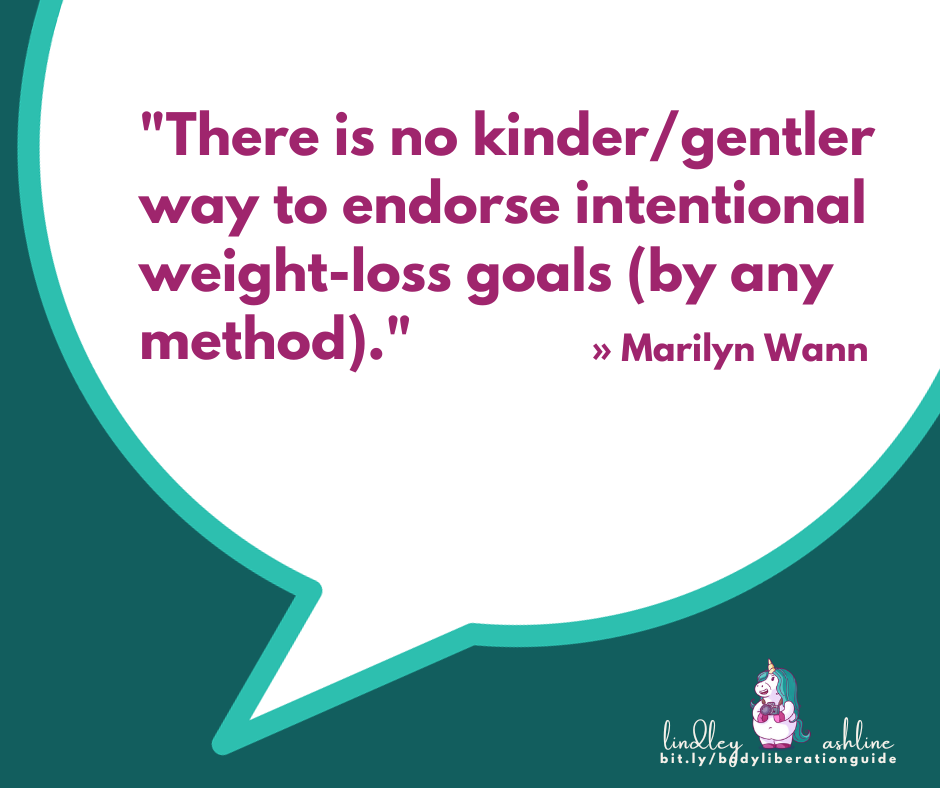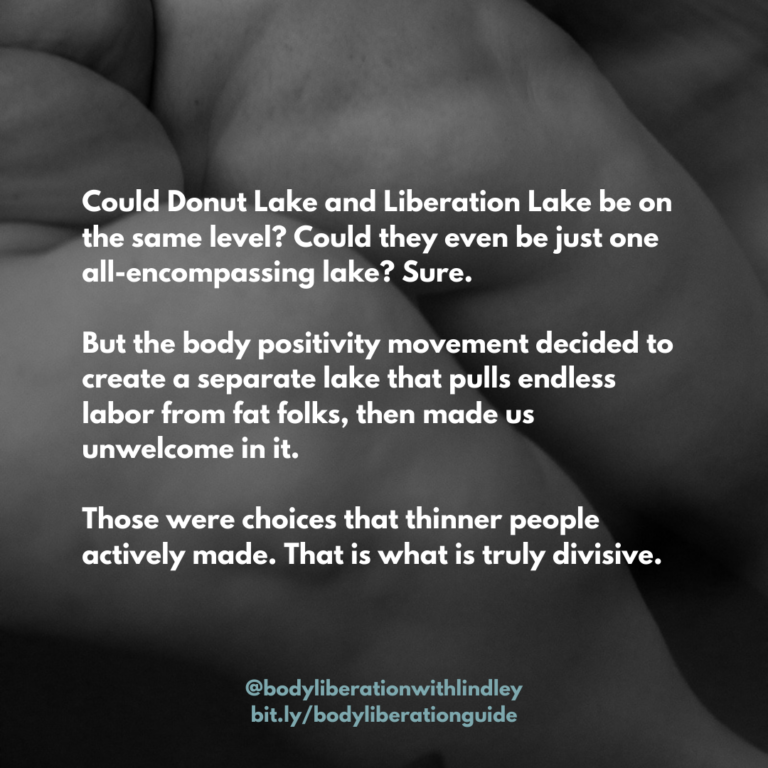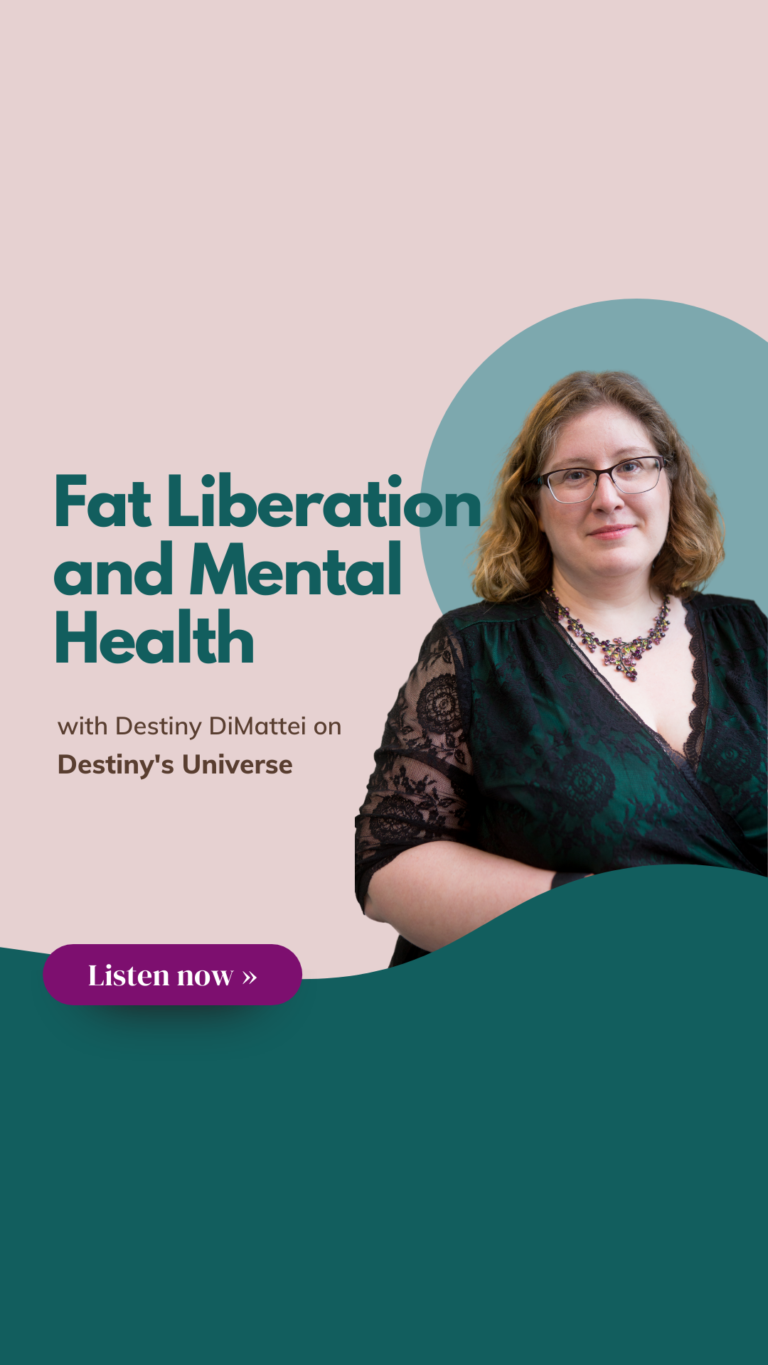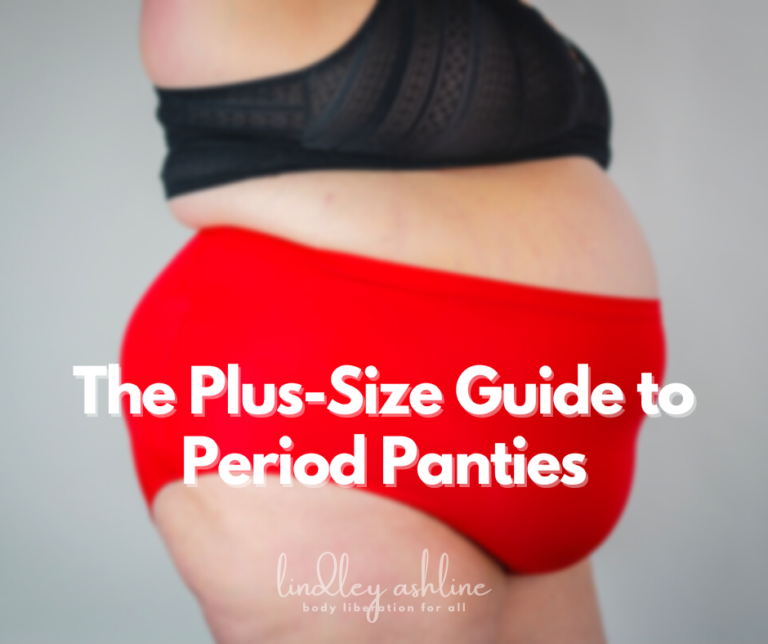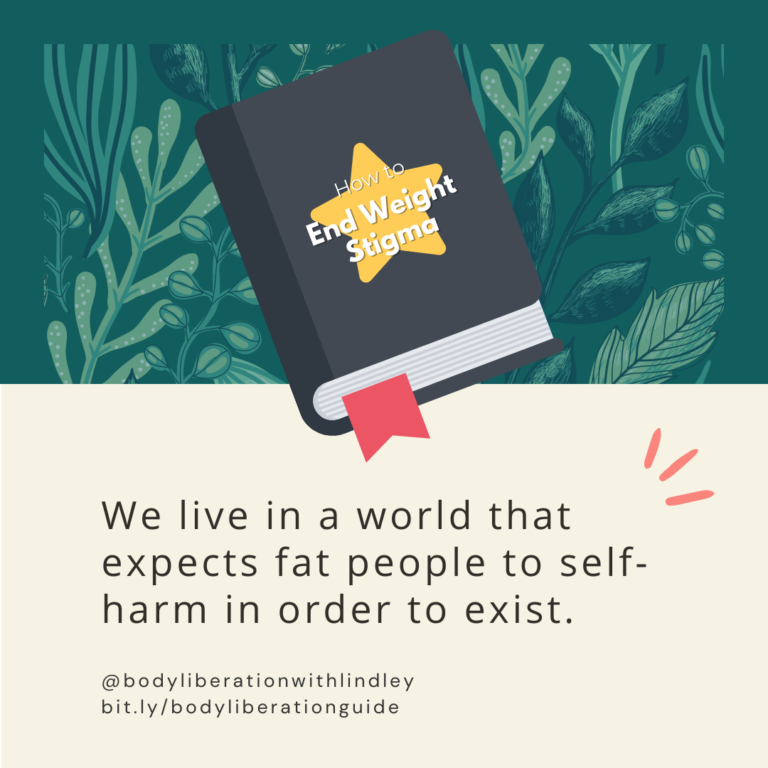Marilyn Wann: “There is no kinder/gentler way to endorse intentional weight-loss goals (by any method).”
I’m so excited to bring you a guest piece from Marilyn freakin’ Wann this week! Marilyn is one of the fat activists I admire the most, who’s been fighting for fat justice and rights since I was knee-high. She’s also the author of the book Fat!So?, and you can learn more about her here. Marilyn recently shared a reply she’d written to a request for her expertise that was so strong and beautiful, and graciously allowed me to share it with you as well.
From Marilyn:
Someone I crossed paths with decades ago emailed me this week to ask for my input on some work product. Maybe they would quote me! That person and a cc’ed colleague have job titles that reference marketing and strategy and diversity and cross cultural stuff. They work at some kind of health consulting firm that’s currently advising a company that creates content that patients encounter in medical settings.
And the topic they are working on…O-word.
They’ve done a survey of fat people and they’ve written a report! What do the fatties want? And by the way, why are they so fat? And how can you optimize profits…er, show fat patients how much you care…while they wait to see a medical professional?
My reply:
Fatness is not a disease, it’s a part of human diversity. (Even the AMA’s position goes against its own scientific advisory board’s findings and recommendation.) As it has done to so many groups of people with marginalized identities, the medical system targets fat people with a familiar combo: 1. harmful, unethical attempts to “cure” us of our difference and 2. dangerous, sometimes deadly, weight-based denials of access to the kind and/or quality of medical care that is routinely and reliably available to non-fat people. (The fattest people — especially higher weight people with multiple, marginalized identities — are most targeted and thus face the most harm.)Bias against fatness and fat people arose historically as part of the attempt to justify enslaving Black people. Books by Sabrina Strings, PhD, and Da’Shaun L. Harrison on this topic are necessary reads.
Negative stereotypes about fat people (lazy, stupid, dirty, gluttonous, etc.) are a necessary part of the project of normalizing both anti-fatness and the prejudices that inherently connect to it: racism, misogyny, ableism, classism, homophobia and transphobia, anti-immigrant xenophobia, and their concomitant thin/white/straight/rich/cis/able-bodied supremacy.Your paper seeks to explain why fat people exist. Either we are badly behaved (see stereotypes mentioned above) or we are victims of an allegedly obesigenic environment (anti-fatness + classism), or we are diseased by definition, regardless of our actual health status (i.e., eugenics). We need no such excuses or explanation.
This search for a reason why fat people exist is only necessary as part of the larger goal of removing fatness from individuals and from the population. Your paper participates in and fails to challenge this eugenics project.
Nonetheless, fat people have always existed. Fat people will always exist. We don’t need anyone’s permission!
Here are two classic quotes that I’m known for…
The only thing anyone can diagnose with any certainty by looking at a fat person is their own level of weight prejudice.
If you don’t want fat people to exist, you don’t get to talk about our health.
In addition to the historical roots of anti-fatness in anti-Blackness, fat people with multiple marginalized identities face exponential threat from the medical system. Understanding the unethical nature and the enormity of harm of the weight-centric “health” model requires an intersectional analysis.There is no kinder/gentler way to endorse intentional weight-loss goals (by any method). It is always eugenics.
Fat people are susceptible to the pervasive anti-fat worldview. Our effort to create resources of resistance and liberation meet constant, increasing, vastly resourced opposition from an array of stakeholders who profit hugely and directly from anti-fatness: a $70 billion/year U.S. weight loss industry (whose business model relies on the near-total failure rate of its product), “obesity” [sic] researchers, anti-“obesity” [sic] public health programs, pharma, etc.
Fat activist community has existed since the mid-1960s. Health professionals in numerous disciplines started developing an evidence-based, weight-neutral approach in the mid-1980s. Academics came together to formalize their work as the field fat studies in the mid-2000s. Your paper alludes to the existence of a resistance/liberation community but carefully avoids naming us or giving us any credit. I notice the omission.
Sadly, fat people may not know about the social justice approach to our identity. In our daily lives, fat people do not typically have available fat-positive families or friend groups or neighborhoods or workplaces or schools or social clubs or consumer/entertainment experiences. Even if fat people connect with fat lib resources, there’s a lot to unlearn and it’s an ongoing endeavor.
People unavoidably internalize anti-fatness. To survive socially and to survive interactions in medical settings, it should not be surprising when fat people end up trying to appease our oppressors by undertaking intentional weight-loss goals. So I find it particularly heartbreaking that your work surveys fat people’s opinions about fatness and health and uses the inevitable presence of internalized fat oppression to support an argument for precisely the weight-centric medical model that is already a primary driver of fat oppression in society.
The ambivalence about so-called weight management, that your survey found among fat people, stems in large part from the fact that we know from lived experience that weight-loss methods fail and that they hurt us in the process, we know that repeated weight cycling is bad for our physical and mental health, but we also know that nearly everyone we encounter in medical settings will still be invested in anti-fatness and unable or unwilling to acknowledge the data about its failure rates and its harms. Those of us who use a weight-neutral approach end up relying on each other to locate health professionals who can respect us and be trusted to help us. Businesses like yours are no help in this regard and are counterproductive.
My position on weight and health has been the same since I began doing fat activism in the mid-1990s. I can only imagine, [name removed], that you are aware of who I am. We had at least one personal conversation on these issues decades ago, when last we interacted. Perhaps you sought this message. It’s clearly needed. If there is some possibility that you and others at your establishment are able to hear this information and refrain from doing harm, that will be useful. If your goal is to help the medical system profit on the backs of fat people, I can’t stop you, but I’m 100% opposed and will have nothing to do with it.
I have done the mental and emotional labor of writing this reply so that we all know that you’ve both been informed, as clearly as possible: You can either do weight-centric medicine/weight-loss goals or you can support social justice, but you can’t do both. There is no way to square that circle.
Do not quote me in your piece.
Do not mention me in your piece.
Sincerely,
Marilyn Wann
author of FAT!SO?
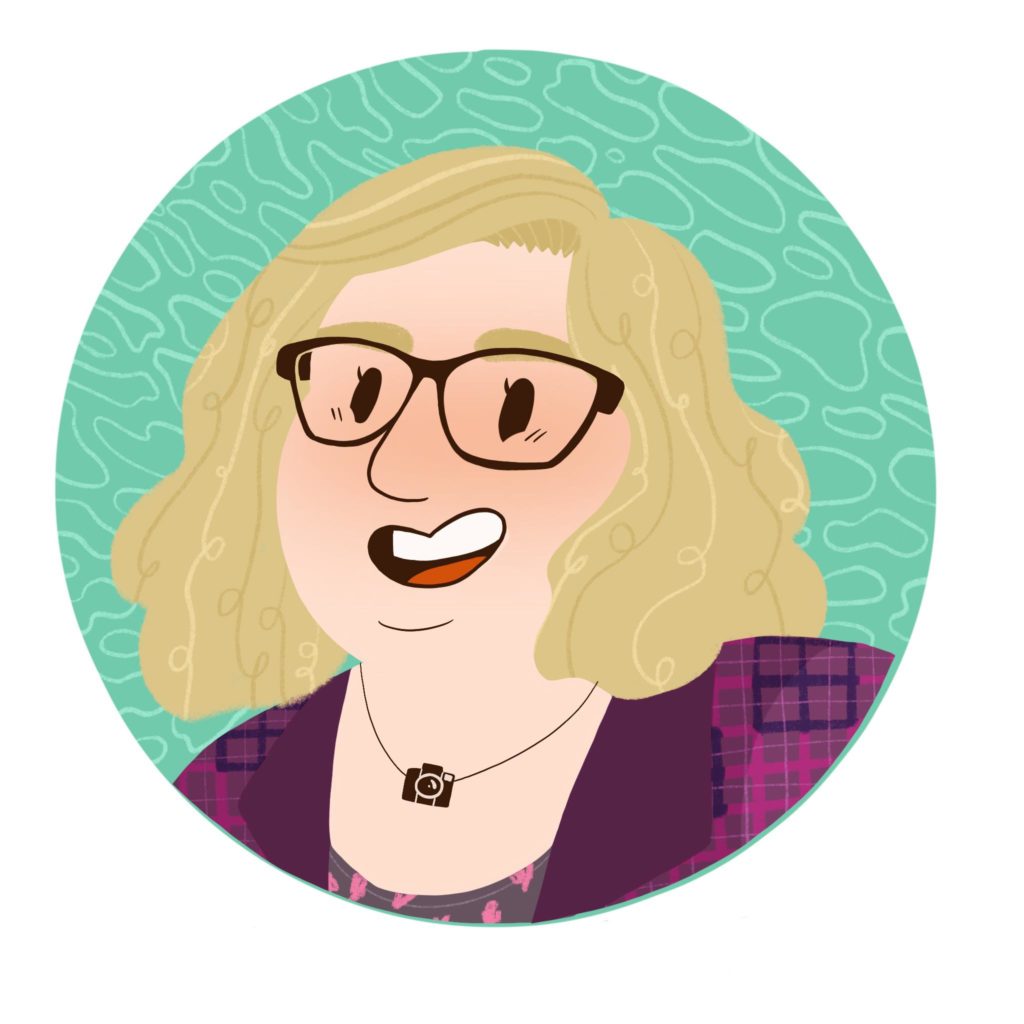
Every Monday, I send out my Body Liberation Guide, a thoughtful email jam-packed with resources on body liberation, weight stigma, body image and more. And it’s free. Let’s change the world together.
Hi there! I'm Lindley. I create artwork that celebrates the unique beauty of bodies that fall outside conventional "beauty" standards at Body Liberation Photography. I'm also the creator of Body Liberation Stock and the Body Love Shop, a curated central resource for body-friendly artwork and products. Find all my work here at bodyliberationphotos.com.

